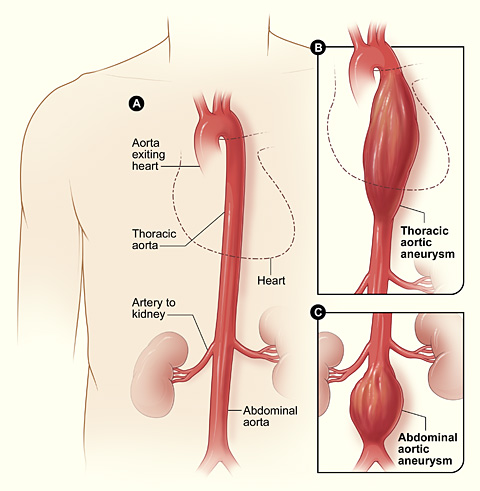An Aortic aneurysm is a balloon-like bump in the aorta, the large artery that supply blood from the heart down the chest and torso. Aortic aneurysm is caused by a weakening of the artery wall, which can lead to dissection or rupture, both of which can be fatal.
Risk factors include Aortic aneurysm are :
- Smoking
- Some inherited connective tissue disorders
- A family history of aortic aneurysms
- Treatment includes medications and surgery.
What Are The Treatments For Aortic Aneurysm?
There are two major treatments for aortic aneurysms: surgery and medical treatment. Surgery involves removing the affected section of the aorta and replacing it with a synthetic graft. Medical treatment involves treating the underlying cause of the aneurysm. This includes controlling hypertension, stopping smoking, and reducing cholesterol levels. If left untreated, the aneurism can rupture, causing internal bleeding and possibly death.
What are the risks associated with heart Attack?
The risks associated with heart attack include high blood cholesterol, high blood pressure, physical inactivity, smoking and vaping, obesity, high LDL cholesterol, low HDL cholesterol, chronic stress and anxiety, poor mental health, and high blood pressure (hypertension).
How to control hypertension?
To control hypertension, it is important to make lifestyle changes such as
- Eating a healthy diet
- Limiting alcohol
- Exercising regularly
- Reducing salt (sodium) in the diet
- Losing extra pounds
- Getting a good night’s sleep
- Quitting smoking
- Reducing stress
- and monitoring your blood pressure at home and getting regular checkups.
How to control diabetes?
To control diabetes, it is important to maintain healthy lifestyle habits like
- Eating a balanced diet,
- Exercising regularly and managing stress levels.
- Eating healthy carbohydrates,
- Reducing salt intake and limiting red and processed meats
- It can help manage blood sugar levels. Being physically active and making it part of your routine helps your body to more sensitive to insulin which leads to control of blood sugar in the body. Additionally, it is important to check blood sugar regularly and take any prescribed medications as directed by your doctor.
What are the treatments for a heart attack?
Treatments for a heart attack may include medication such as aspirin, clot busters, other blood-thinning drugs, nitroglycerin, morphine, beta-blockers, ACE inhibitors, and statins. In addition, it requires surgical and other procedures such as coronary angioplasty and stenting, coronary artery bypass surgery, and cardiac rehabilitation may also be used to treat a heart attack.
What are the treatments for a diabetes ?
The treatments for diabetes vary depending on the type of diabetes. For people with type 1 diabetes, insulin injections or an insulin pump are necessary to manage blood glucose levels. People with type 2 diabetes may initially be able to manage their diabetes with diet and exercise, but some may require tablets or insulin injections. Other diabetes types may require different treatments. People with diabetes are also entitled to free prescriptions. Treatment may also include monitoring blood glucose levels, dietary management, maintaining physical activity, and taking diabetes medicines such as insulin or tablets.

